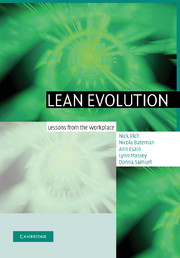Book contents
- Frontmatter
- Contents
- List of boxes
- List of figures
- List of tables
- Glossary
- 1 Introduction
- 2 Understanding the lean journey
- 3 Understanding your organisation
- 4 Laying the foundation stone of CANDO
- 5 Visual management and performance measurement
- 6 Problem solving, TQM and Six Sigma
- 7 Pull systems
- 8 Total productive manufacturing (TPM)
- 9 Sustainability
- 10 Group learning
- 11 Reflections and future challenges
- References
- Index
9 - Sustainability
Published online by Cambridge University Press: 17 August 2009
- Frontmatter
- Contents
- List of boxes
- List of figures
- List of tables
- Glossary
- 1 Introduction
- 2 Understanding the lean journey
- 3 Understanding your organisation
- 4 Laying the foundation stone of CANDO
- 5 Visual management and performance measurement
- 6 Problem solving, TQM and Six Sigma
- 7 Pull systems
- 8 Total productive manufacturing (TPM)
- 9 Sustainability
- 10 Group learning
- 11 Reflections and future challenges
- References
- Index
Summary
Introduction
At LERC we frequently receive enquiries about sustainability of lean programmes. Specifically managers want to know what can be done to maintain the improvements already made and continue the drive to improve. What we would like to reply is, ‘Take these three simple steps and you will have guaranteed sustainability.’ Sadly all our experience and research shows that different organisations and even different activities within the same organisation have varying problems with sustainability and so a more contingent, less prescriptive approach has to be adopted.
This chapter will look at what we mean by sustainability, and how we know when we achieve it. At LERC we have also conducted some research in this area with the Society of Motor Manufacturers and Traders' (SMMT) Industry Forum (IF) and we will be outlining the findings of this research and some additional findings from our Learn 2 companies (Bateman, 2001). The Learn 2 companies were aware of the IF findings and had the opportunity to implement them. We conducted some research to see how effective they had been and explore the opinions of the change agents at each of the companies. The outcome of this research was less definitive and highlighted some of the difficulties with applying a formal model to sustainability of improvements. The chapter concludes by exploring how the research findings can be used by managers in their own organisations.
Box 9.1 shows some definitions used in this chapter.
- Type
- Chapter
- Information
- Lean EvolutionLessons from the Workplace, pp. 163 - 184Publisher: Cambridge University PressPrint publication year: 2006



